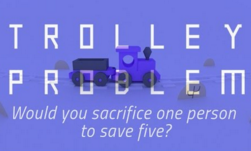台湾籍旅美老师今天交给我们的句子是:
Our instincts tell us that deliberately causing someone's death is different that allowing them to die as collateral damage. It just feels wrong for reasons that are hard to explain. This intersection between ethics and psychology is what's so interesting about the trolley problem. The dilemma in its many variations reveal that what we think is right or wrong depends on factors other than a logical weighing of the pros and cons.
我们的直觉告诉我们:“故意致人于死”与“放手不管而让人死去使其成为附带牺牲品”,这是不同的。这就是令人感觉不太对劲儿却又难以解释原因。道德学和心理学的交会处(人生的十字路口),就是电车难题为何如此有意思的地方。各式各样的困境难题显示,我们所认为的对错判断除了取决于逻辑上利弊权衡之外,还有其它因素。

学习重点:
1.instinct 本能
instinct (n.) 本能
instinctively (adj.) 本能的
2.deliberately 慎重的
deliberately (adv.) 慎重的
deliberate (adj.) 慎重的
3.collateral 并行的
collateral (adj.) 并行的
4.ethic 道德的
ethic (adj.) 道德的
ethnic (adj.) 异教徒的
5.dilemma 困境
dilemma (n.) 困境












